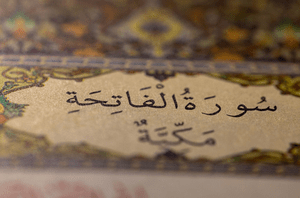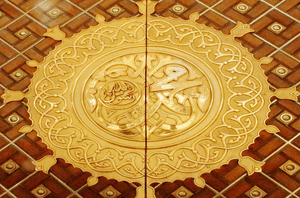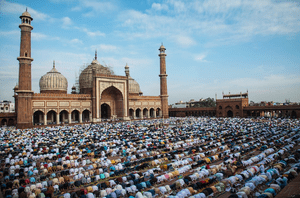After the second sajdah, sit up straight. You are now almost at the point of concluding your ṣalāh assuming it is a two rakʿah prayer. Prior to concluding your ṣalāh, you will sit before Allah (ʿazza wa jall), glorifying and praising Him, while also making any final requests.
ʿAbdullāh b. ʿAbbās (radiy Allāhu ʿanhumā) said, “The Messenger of Allah ﷺ would teach us the tashahhud like he would teach us a sūrah from the Qur’ān” (Muslim).
Although there are slight variations to the wording of the tashahhud, the following is one of them. Try your best to memorise what it means.
اَلتَّحِيَّاتُ لِلّٰهِ، وَالصَّلَوَاتُ وَالطَّيِّبَاتُ، اَلسَّلاَمُ عَلَيْكَ أَيُّهَا النَّبِيُّ وَرَحْمَةُ اللّٰهِ وَبَرَكَاتُهُ ، اَلسَّلاَمُ عَلَيْنَا وَعَلَىٰ عِبَادِ اللّٰهِ الصَّالِحِيْنَ، أَشْهَدُ أَنْ لَّا إِلٰهَ إِلَّا اللّٰهُ ، وَأَشْهَدُ أَنَّ مُحَمَّدًا عَبْدُهُ وَرَسُوْلُهُ
All royal greetings belong to Allah, as do prayers and good (deeds and words). May peace, the mercy of Allah and His blessings be upon you O Prophet. Peace be upon us and upon the righteous servants of Allah. I bear witness that there is no god worthy of worship except Allah, and I bear witness that Muhammad is His slave and Messenger (Bukhārī).
اَلتَّحِيَّاتُ لِلّٰهِ، وَالصَّلَوَاتُ وَالطَّيِّبَاتُ
اَلتَّحِيَّاتُ [All royal greetings]: In different cultures, royalty are shown respect in different ways. Some stand upon their arrival and wait for them to be seated before they themselves sit down. Others bow and curtsy. Royalty are also addressed with specific terms of honour (‘Your Honour/Majesty, Your Royal Highness’, etc.) and protocols usually dictate what can and cannot be uttered when greeting them.
Taḥiyyāt is plural of the word taḥiyyah, and is derived from the word ‘ḥayāt’, meaning life in Arabic. It is a form of greeting similar to ‘Long live the King/ Queen…’ For Allah (ʿazza wa jall), it means that everlasting kingship, ownership and sovereignty belong only to Him as He Alone is the Ever-Living, the only One who will never die. Thus, He (ʿazza wa jall) is most worthy of all praises and greetings. This is why we say the plural form at-Taḥiyyātu (all royal greetings) and not at-Taḥiyyatu (the singular form) to Allah.
وَالصَّلَوَاتُ [All prayers]: All of the ṣalāh we pray and the supplications we make are only directed to Allah.
وَالطَّيِّبَاتُ [All good]: Ṭayyibāt refers to pure attributes, actions and words. Allah (ʿazza wa jall) is Pure and only accepts the ‘pure’. All of His Actions and Attributes are Pure. He is the Lord of the pure ones, and it is only the pure ones who will be granted closeness to Him in the Abode of eternal honour (Paradise). Only pure actions and words, which are carried out solely for His sake, ascend to Him.
An Alternative Meaning to the Tashahhud:
TAḤIYYĀT – All verbal forms of worship
ṢALAWĀT – All physical forms of worship
ṬAYYIBĀT – All monetary forms of worship
اَلسَّلاَمُ عَلَيْكَ أَيُّهَا النَّبِيُّ وَرَحْمَةُ اللّٰهِ وَبَرَكَاتُهُ
Along with the right Allah (ʿazza wa jall), the Creator, has over you, His creation also has a right over you. They have a right to share a portion of your ṣalāh. Accordingly, you should begin with praying for the best of creation, Muḥammad ﷺ, and then follow this by praying for the righteous servants of Allah.
اَلسَّلاَمُ عَلَيْكَ أَيُّهَا النَّبِيُّ [May peace be upon you O Prophet]: al-Salām is one of the Perfect Names of Allah (ʿazza wa jall). By stating ‘peace be upon you’, you are seeking the protection of Allah (ʿazza wa jall) for the person you are greeting. You are asking Allah (ʿazza wa jall) to take care of him and to keep him safe from all harm and evil.
What you are saying is, “O Allah, protect Muḥammad ﷺ in his daʿwah and protect his ummah from every type of deficiency, so that his message reigns supreme, and the glory and honour of his ummah increase.”
رَحْمَةُ اللّٰهِ [The mercy of Allah]: You are asking Allah (ʿazza wa jall) to give Muḥammad ﷺ every possible good, and to reward him for everything he did for us.
In offering our salām to Muḥammad ﷺ we are also benefitting, as he responds to our greetings. Allah (ʿazza wa jall) has greatly privileged us by making us the beneficiaries of the duʿā’ of the greatest man to have walked on this earth. He ﷺ said, “There is no one who sends salām upon me, except that Allah returns my soul to me so that I may respond to his salām” (Abū Dāwūd).
وَبَرَكَاتُهُ [His blessings]: Barakāt is the plural of barakah which linguistically means growth and increase. You are asking Allah (ʿazza wa jall) to bless the Prophet ﷺ and to bless him ﷺ in his followers by: (1) increasing their numbers and (2) by occupying them in worship as he will share in their reward.
اَلسَّلاَمُ عَلَيْنَا وَعَلَىٰ عِبَادِ اللّٰهِ الصَّالِحِيْنَ
After this, you send greetings upon yourself and upon the chosen righteous servants of Allah (ʿazza wa jall), in accordance with the command of Allah (ʿazza wa jall) to His beloved ﷺ, “Say, all praise is for Allah, and may peace be upon His servants whom He has chosen” (27:59).
The caveat here of the ‘righteous’ shows you the importance of trying your best to be from them and to always keep their company.
The Prophet ﷺ said that when one utters the above, the supplication “reaches every worshipper in the sky and the earth” (Bukhārī).
أَشْهَدُ أَنْ لَّا إِلٰهَ إِلَّا اللّٰهُ ، وَأَشْهَدُ أَنَّ مُحَمَّدًا عَبْدُهُ وَرَسُوْلُهُ
Then attest to the Oneness of Allah (ʿazza wa jall). Through this phrase you affirm that He is the only One worthy of being worshipped, loved and obeyed. Everything and anything other than Him (ʿazza wa jall) that is worshipped is falsehood.
أَشْهَدُ [I testify]: Ash-hadu means ‘I testify’. You ‘testify’ to something being true when you are certain of its authenticity. Accordingly, this word is befitting here as you are certain that Allah (ʿazza wa jall) is the only One worthy of being worshipped and Muḥammad ﷺ is the slave and Messenger of Allah.
When uttering these words, re-affirm these words by simultaneously raising your index finger to indicate the Oneness of Allah (ʿazza wa jall). When doing so, you must also strive to feel the impact of these words, feeling that you are strangling Shayṭān with this action. When ʿAbdullāh b. ʿUmar (radiy Allāhu ʿanhumā) would sit down in ṣalāh, he would place his hands on his knees and point with his finger and keep his eye focused on it. He said that the Messenger of Allah ﷺ said that the finger is “harder on Shayṭān than iron” (Aḥmad).





